

CHAPTER III
"THE PERSONAL REPRESENTATIVE OF THE KAISER"---WANGENHEIM OPPOSES THE SALE OF AMERICAN WARSHIPS TO GREECE
But even in March, 1914, the Germans had pretty well tightened their hold on Turkey. Liman von Sanders, who had arrived in December, had become the predominant influence in the Turkish army. At first Von Sanders' appointment aroused no particular hostility, for German missions had been called in before to instruct the Turkish army, notably that of Von der Goltz, and an English naval mission, headed by Admiral Limpus, was even then in Turkey attempting the difficult task of reorganizing the Turkish navy. We soon discovered, however, that the Von Sanders military mission was something quite different from those which I have named. Even before Von Sanders' arrival it had been announced that he was to take command of the first Turkish army corps, and that General Bronssart von Schnellendorf was to become Chief of Staff. The appointments signified nothing less than that the Kaiser had almost completed his plans to annex the Turkish army to his own. To show the power which Von Sanders' appointment had given him, it is only necessary to say that the first army corps practically controlled Constantinople. These changes clearly showed to what an extent Enver Pasha had become a cog in the Prussian system.
Naturally the representatives of the Entente Powers could not tolerate such a usurpation by Germany. The British, French, and Russian Ambassadors immediately called upon the Grand Vizier and protested with more warmth than politeness over Von Sanders' elevation. The Turkish Cabinet hemmed and hawed in the usual way, protested that the change was not important, but finally it withdrew Von Sanders' appointment as head of the first army corps, and made him Inspector General. However, this did not greatly improve the situation, for this post really gave Von Sanders greater power than the one which he had held before. Thus, by January, 1914, seven months before the Great War began, Germany held this position in the Turkish army: a German general was Chief of Staff; another was Inspector General; scores of German officers held commands of the first importance, and the Turkish politician who was even then an outspoken champion of Germany, Enver Pasha, was Minister of War.
After securing this diplomatic triumph Wangenheim was granted a vacation---he had certainly earned it---and Giers, the Russian Ambassador, went off on a vacation at the same time. Baroness Wangenheim explained to me---I was ignorant at this time of all these subtleties of diplomacy---precisely what these vacations signified. Wangenheim's leave of absence, she said, meant that the German Foreign Office regarded the Von Sanders episode as closed---and closed with a German victory. Giers's furlough, she explained, meant that Russia declined to accept this point of view and that, so far as Russia was concerned, the Von Sanders affair had not ended. I remember writing to my family that, in this mysterious Near-Eastern diplomacy, the nations talked to each other with acts, not words, and I instanced Baroness Wangenheim's explanation of these diplomatic vacations as a case in point.
An incident which took place in my own house opened all our eyes to how seriously Von Sanders regarded this military mission. On February 18th, I gave my first diplomatic dinner; General Von Sanders and his two daughters attended, the General sitting next to my daughter Ruth. My daughter, however, did not have a very enjoyable time; this German field marshal, sitting there in his gorgeous uniform, his breast all sparkling with medals, hardly said a word throughout the whole meal. He ate his food silently and sulkily, all my daughter's attempts to enter into conversation evoking only an occasional surly monosyllable. The behaviour of this great military leader was that of a spoiled child.
At the end of the dinner Von Mutius, the German chargé d'affaires, came up to me in a high state of excitement. It was some time before he could sufficiently control his agitation to deliver his message.
"You have made a terrible mistake, Mr. Ambassador," he said.
"What is that?" I asked, naturally taken aback.
"You have greatly offended Field Marshal Von Sanders. You have placed him at the dinner lower in rank than the foreign ministers. He is the personal representative of the Kaiser and as such is entitled to equal rank with the ambassadors. He should have been placed ahead of the cabinet ministers and the foreign ministers."
So I had affronted the Emperor himself! This, then, was the explanation of Von Sanders' boorish behaviour. Fortunately, my position was an impregnable one. I had not arranged the seating precedence at this dinner; I had sent the list of my guests to the Marquis Pallavicini, the Austrian Ambassador and dean of the diplomatic corps, and the greatest authority in Constantinople on such delicate points as this. The Marquis had returned the list, marking in red ink against each name the order of precedence 1, 2, 3, 4, 5, etc. I still possess this document as it came from the Austrian Embassy, and General Von-Sanders' name appears with the numerals "13" against it. I must admit, however, that "the 13th chair" did bring him pretty well to the foot of the table.
I explained the situation to Von Mutius and asked M. Panfili, conseiller of the Austrian Embassy, who was a guest at the dinner, to come up and make everything clear to the outraged German diplomat. As the Austrians and Germans were allies, it was quite apparent that the slight, if slight there had been, was unintentional. Panfili said that he had been puzzled over the question of Von Sanders's position, and had submitted the question to the Marquis. The outcome was that the Austrian Ambassador had himself fixed Von Sanders' rank at number 13. But the German Embassy did not let the matter rest there, for afterward Wangenheim called on Pallavicini, and discussed the matter with considerable liveliness.
"If Liman von Sanders represents the Kaiser, whom do you represent?" Pallavicini asked Wangenheim. The argument was a good one, as the ambassador is always regarded as the alter ego of his sovereign.
"It is not customary," continued the Marquis, "for an emperor to have two representatives at the same court."
As the Marquis was unyielding, Wangenheim carried the question to the Grand Vizier. But Saïd Halim refused to assume responsibility for so momentous a decision and referred the dispute to the Council of Ministers. This body solemnly sat upon the question and rendered this verdict: Von Sanders should rank ahead of the ministers of foreign countries, but below the members of the Turkish Cabinet. Then the foreign ministers lifted up their voices in protest. Von Sanders not only became exceedingly unpopular for raising this question, but the dictatorial and autocratic way in which he had done it aroused general disgust. The ministers declared that, if Von Sanders were ever given precedence at any function of this kind, they would leave the table in a body. The net result was that Von Sanders was never again invited to a diplomatic dinner. Sir Louis Mallet, the British Ambassador, took a sardonic interest in the episode. It was lucky, he said, that it had not happened at his Embassy; if it had, the newspapers would have had columns about the strained relations between England and Germany!
After all, this proceeding did have great international importance. Von Sanders's personal vanity had led him to betray a diplomatic secret; he was not merely a drill master who had been sent to instruct the Turkish army; he was precisely what he had claimed to be---the personal representative of the. Kaiser. The Kaiser had selected him, just as he had selected Wangenheim, as an instrument for working his will in Turkey. Afterward Von Sanders told me, with all that pride which German aristocrats manifest when speaking of their imperial master, how the Kaiser had talked to him a couple of hours the day he had appointed him to this Constantinople mission, and how, the day that he had started, Wilhelm had spent another hour giving him final instructions. I reported this dinner incident to my government as indicating Germany's growing ascendancy in Turkey and I presume the other ambassadors likewise reported it to their governments. The American military attaché, Major John R. M. Taylor, who was present, attributed the utmost significance to it. A month after the occurrence he and Captain McCauley, commanding the Scorpion, the American stationnaire at Constantinople, had lunch at Cairo with Lord Kitchener. The luncheon was a small one, only the Americans, Lord Kitchener, his sister, and an aide making up the party. Major Taylor related this incident, and Kitchener displayed much interest.
"What do you think it signifies ?" asked Kitchener.
"I think it means," Major Taylor said, "that when the big war comes, Turkey will probably be the ally of Germany. If she is not in direct alliance, I think that she at least will mobilize on the line of the Caucasus and thus divert three Russian army corps from the European theatre of operations."
Kitchener thought for a moment and then said, "I agree with you."
And now for several months we had before our eyes this spectacle of the Turkish army actually under the control of Germany. German officers drilled the troops daily---all, I am now convinced, in preparation for the approaching war. Just what results had been accomplished appeared when, in July, there was a great military review. The occasion was a splendid and a gala affair. The Sultan attended in state; he sat under a beautifully decorated tent where he held a little court; and the Khedive of Egypt, the Crown Prince of Turkey, the princes of the imperial blood and the entire Cabinet were also on hand. We now saw that, in the preceding six months, the Turkish army had been completely Prussianized. What in January had been an undisciplined, ragged rabble was now parading with the goose step; the men were clad in German field gray, and they even wore a casque-shaped head covering, which slightly suggested the German pickelhaube. The German officers were immensely proud of the exhibition, and the transformation of the wretched Turkish soldiers of January into these neatly dressed, smartly stepping, splendidly manoeuvring troops was really a creditable military achievement. When the Sultan invited me to his tent I naturally congratulated him upon the excellent showing of his men. He did not manifest much enthusiasm; he said that he regretted the possibility of war; he was at heart a pacifist. I noticed certain conspicuous absences from this great German fête, for the French, British, Russian, and Italian ambassadors had kept away. Bompard said that, he had received his ten tickets but that he did not regard that as an invitation. Wangenheim told me, with some satisfaction, that the other, ambassadors were jealous and that they did not care to see the progress which the Turkish army had made under German instruction. I did not have the slightest question that these ambassadors refused to attend because they had no desire to grace this German holiday; nor did I blame them.
Meanwhile, I had other evidences that Germany was playing her part in Turkish politics. In June the relations between Greece and Turkey approached the breaking-point. The Treaty of London (May 30, 1913) had left Greece in possession of the islands of Chios and Mitylene. A reference to the map discloses the strategic importance of these islands. They stand there in the Aegean Sea like guardians controlling the bay and the great port of Smyrna, and it is quite apparent that any strong military nation which permanently held these vantage points would ultimately control Smyrna and the whole Aegean coast of Asia Minor. The racial situation made the continued retention of these islands by Greece a constant military danger to Turkey. Their population was Greek and had been Greek since the days of Homer; the coast of Asia Minor itself was also Greek; more than half the population of Smyrna, Turkey's greatest Mediterranean seaport, was Greek; in its industries, its commerce, and its culture the city was so predominantly Greek that the Turks usually referred to it as giaour Ismir---"infidel Smyrna." Though this Greek population was nominally Ottoman in nationality it did not conceal its affection for the Greek fatherland, these Asiatic Greeks even making contributions to promote Greek national aims. The Aegean islands and the mainland, in fact, constituted Graecia Irredenta; and that Greece was determined to redeem them, precisely as she had recently redeemed Crete, was no diplomatic secret. Should the Greeks ever land an army on this Asia Minor coast, there was little question that the native Greek population would welcome it enthusiastically and cooperate with it.
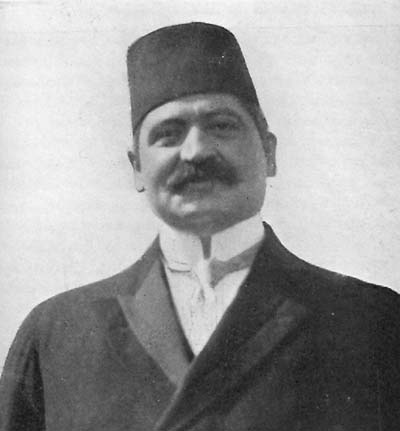
Fig. 7. TALAAT
PASHA, EX-GRAND VIZIER OF TURKEY. In 1914, when the war broke out, Talaat
was Minister of the Interior and the most influential leader in the Committee
of Union and Progress, the secret organization which controlled the Turkish
Empire. A few years ago Talaat was a letter-carrier, and afterward a telegraph
operator in Adrianople. His talents are those of a great political boss.
He represented Turkey in the peace negotiations with Russia and his signature
appears on the Brest-Litovsk treaty
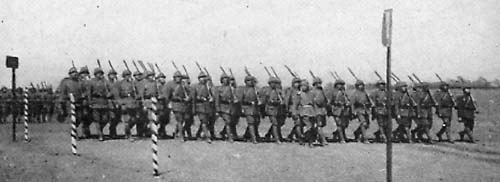
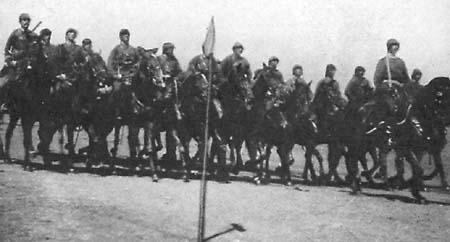
Fig. 8. TURKISH
INFANTRY AND CAVALRY. In January, 1914, the Turkish Army was a ragged, undisciplined
force. These troops, drilled by German military instructors, show the result
of six months' training
Since Germany, however, had her own plans for Asia Minor, inevitably the Greeks in this region formed a barrier to Pan-German aspirations. As long as this region remained Greek, it formed a natural obstacle to Germany's road to the Persian Gulf, precisely as did Serbia. Any one who has read even cursorily the literature of Pan-Germania is familiar with the peculiar method which German publicists have advocated for dealing with populations that stand in Germany's way. That is by deportation. The violent shifting of whole peoples from one part of Europe to another, as though they were so many herds of cattle, has for years been part of the Kaiser's plans for German expansion. This is the treatment which, since the war began, she has applied to Belgium, to Poland, to Serbia; its most hideous manifestation, as I shall show, has been to Armenia. Acting under Germany's prompting, Turkey now began to apply this principle of deportation to her Greek subjects in Asia Minor. Three years afterward the German admiral, Usedom, who had been stationed in the Dardanelles during the bombardment, told me that it was the Germans "who urgently made the suggestion that the Greeks be moved from the seashore." The German motive, Admiral Usedom said, was purely military. Whether Talaat and his associates realized that they were playing the German game I am not sure, but there is no doubt that the Germans were constantly instigating them in this congenial task.
The events that followed foreshadowed the policy adopted in' the Armenian massacres. The Turkish officials pounced upon the Greeks, herded them in groups and marched them toward the ships. They gave them no time to settle their private affairs, and they took no pains to keep families together. The plan was to transport the Greeks to the wholly Greek islands in the Aegean. Naturally the Greeks rebelled against such treatment, and occasional massacres were the result, especially in Phocaea, where more than fifty people were murdered. The Turks demanded that all foreign establishments in Smyrna dismiss their Greek employees and replace them with Moslems. Among other American concerns, the Singer Manufacturing Company received such instructions, and though I interceded and obtained sixty days' delay, ultimately this American concern had to obey the mandate. An official boycott was established against all Christians, not only in Asia Minor, but in Constantinople, but this boycott did not discriminate against the Jews, who have always been more popular with the Turks than have the Christians. The officials particularly requested Jewish merchants. to put signs over their doors indicating their nationality and trade such signs as "Abraham the Jew, tailor," "Isaac the Jew, shoemaker," and the like. I looked upon this boycott as illustrating the topsy-turvy national organization of Turkey, for here we had a nation engaging in a commercial boycott against its own subjects.
This procedure against the Greeks not improperly aroused my indignation. I did not have the slightest suspicion at that time that the Germans had instigated these deportations, but I looked upon them merely as an outburst of Turkish ferocity and chauvinism. By this time I knew Talaat well; I saw him nearly every day, and he used to discuss practically every phase of international relations with me. I objected vigorously to his treatment of the Greeks; I told him that it would make the worst possible impression abroad and that it affected American interests. Talaat explained his national policy: these different blocs in the Turkish Empire, he said, had always conspired against Turkey; because of the hostility of these native populations, Turkey had lost province after province---Greece, Serbia, Rumania, Bulgaria, Bosnia, Herzegovina, Egypt, and Tripoli. In this way the Turkish Empire had dwindled almost to the vanishing point. If what was left of Turkey was to survive, added Talaat, he must get rid of these alien peoples. "Turkey for the Turks " was now Talaat's controlling idea. Therefore he proposed to Turkify Smyrna and the adjoining islands. Already 40,000 Greeks had left, and he asked me again to urge American business houses to employ only Turks. He said that the accounts of violence and murder had been greatly exaggerated and suggested that a commission be sent to investigate. "They want a commission to whitewash Turkey," Sir Louis Mallet, the British Ambassador, told me. True enough, when this commission did bring in its report, it exculpated Turkey.
The Greeks in Turkey had one great advantage over the Armenians, for there was such a thing as a Greek government, which naturally has a protecting interest in them. The Turks knew that these deportations would precipitate a war with Greece; in fact, they welcomed such a war and were preparing for it. So enthusiastic were the Turkish people that they had raised money by popular subscription and bad purchased a Brazilian dreadnaught which was then under construction in England. The government had ordered also a second dreadnaught in England, and several submarines and destroyers in France. The purpose of these naval preparations was no secret in Constantinople. As soon as they obtained these ships, or even the one dreadnaught which was nearing completion, Turkey intended to attack Greece and take back the islands. A single modern battleship like the Sultan Osman---this was the name the Turks had given the Brazilian vessel---could easily overpower the whole Greek navy and control the Aegean Sea. As this powerful vessel would be finished and commissioned in a few months, we all expected the Greco-Turkish war to break out in the fall. What could the Greek navy possibly do against this impending danger?
Such was the situation when, early in June, I received a most agitated visitor. This was Djemal Pasha, the Turkish Minister of Marine and one of the three men who then dominated the Turkish Empire. I have hardly ever seen a man who appeared more utterly worried than was Djemal on this occasion. As he began talking excitedly to my interpreter in French, his whiskers trembling with his emotions and his hands wildly gesticulating, he seemed to be almost beside himself. I knew enough French to understand what he was saying, and the news which he brought---this was the first I had heard of it---sufficiently explained his agitation. The American Government, he said, was negotiating with Greece for the sale of two battleships, the Idaho and the Mississippi. He urged that I should immediately move to prevent any such sale. His attitude was that of a suppliant; he begged, he implored that I should intervene. All along, he said, the Turks regarded the United States as their best friend; I had frequently expressed my desire to help them; well., here was the chance to show our good feeling. The fact that Greece and Turkey were practically on the verge of war, said Djemal, really made the sale of the ships an unneutral act. Still, if the transaction were purely a commercial one, Turkey would like a chance to bid. "We will pay more than Greece," he added. He ended with a powerful plea that I should at once cable my government about the matter, and this I promised to do.
Evidently the clever Greeks had turned the tables on their enemy. Turkey had rather too boldly advertised her intention of attacking Greece as soon as she had received her dreadnaughts. Both the ships for which Greece was now negotiating were immediately available for battle! The Idaho and Mississippi were not indispensable ships for the American navy; they could not take their place in the first line of battle; they were powerful enough, however, to drive the whole Turkish navy from the Aegean. Evidently the Greeks did not intend politely to postpone the impending war until the Turkish dreadnaughts had been finished, but to attack as soon as they received these American ships. Djemal's point, of course, had no legal validity. However great the threat of war might be, Turkey and Greece were still actually at peace. Clearly Greece had just as much right to purchase warships in the United States as Turkey had to purchase them in Brazil or England.
But Djemal was not the only statesman who attempted to prevent the sale; the German Ambassador displayed the keenest interest. Several days after Djemal's visit, Wangenheim and I were riding in the hills north of Constantinople; Wangenheim began to talk about the Greeks, to whom he displayed a violent antipathy, about the chances of war, and the projected sale of American warships. He made a long argument about the sale, his reasoning being precisely the same as Djemal's---a fact which aroused my suspicions that he had himself coached Djemal for his interview with me.
"Just look at the dangerous precedent you are establishing," said Wangenheim. "It is not unlikely that the United States may sometime find itself in a position like Turkey's to-day. Suppose that you were on the brink of war with Japan; then England could sell a fleet of dreadnaughts to Japan. How would the United States like that?"
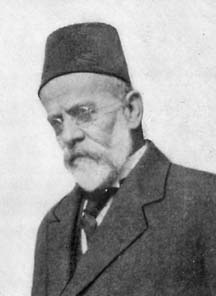 And then he made a statement which indicated what really
lay back of his protest. I have thought of it many times in the last three
years. The scene is indelibly impressed on my mind. There we sat on our
horses; the silent ancient forest of Belgrade lay around us, while in the
distance the Black Sea glistened in the afternoon sun. Wangenheim suddenly
became quiet and extremely earnest. He looked in my eyes and said:
And then he made a statement which indicated what really
lay back of his protest. I have thought of it many times in the last three
years. The scene is indelibly impressed on my mind. There we sat on our
horses; the silent ancient forest of Belgrade lay around us, while in the
distance the Black Sea glistened in the afternoon sun. Wangenheim suddenly
became quiet and extremely earnest. He looked in my eyes and said:
"I don't think that the United States realizes what a serious matter this is. The sale of these ships might be the cause that would bring on a European war."
Fig. 9. BUSTÁNY EFFENDI Ex-Minister of Commerce and Agriculture in the Turkish Cabinet. He came to Mr. Morgenthau in January, 1914, seeking American assistance in financially rehabilitating Turkey.
This conversation took place on June 13th; this was about six weeks before the conflagration broke out. Wangenheim. knew perfectly well that Germany was rushing preparations for this great conflict, and he also knew that preparations were not yet entirely complete. Like all the German ambassadors, Wangenheim, had received instructions not to let any crisis arise that would precipitate war until all these preparations had been finished. He had no objections to the expulsion of the Greeks, for that in itself was part of these preparations; he was much disturbed, however, over the prospect that the. Greeks might succeed in arming themselves and disturbing existing conditions in the Balkans. At that moment the Balkans were a smouldering volcano; Europe had gone through two Balkan wars without becoming generally involved, and Wangenheim knew that another would set the whole continent ablaze. He knew that war was coming, but he did not want it just then. He was simply attempting to influence me at that moment to gain a little more time for Germany.
He went so far as to ask me to cable personally to the President, explain the seriousness of the situation, and to call his attention to the telegrams that had gone to the State Department on the proposed sale of the ships. I regarded his suggestion as an impertinent one and declined to act upon it.
To Djemal and the other Turkish officials who kept pressing me I suggested that their ambassador in Washington should take up the matter directly with the President. They acted on this advice, but the Greeks again got ahead of them. At two o'clock, June 22d, the Greek chargé d'affaires at Washington and Commander Tsouklas, of the Greek navy, called upon the President and arranged the sale. As they left the President's office, the Turkish Ambassador entered---just fifteen minutes too late!
I presume that Mr. Wilson consented to the sale because he knew that Turkey was preparing to attack Greece and believed that the Idaho and Mississippi would prevent such an attack and so preserve peace in the Balkans.
Acting under the authorization of Congress, the administration sold these ships on July 8, 1914, to Fred J. Gauntlett, for $12,535,276.98. Congress immediately voted the money realized from the sale to the construction of a great modern dreadnaught, the California. Mr. Gauntlett transferred the ships to the Greek Government. Rechristened the Kilkis and the Lemnos, those battleships immediately took their places as the most powerful vessels of the Greek Navy, and the enthusiasm of the Greeks in obtaining them was unbounded.
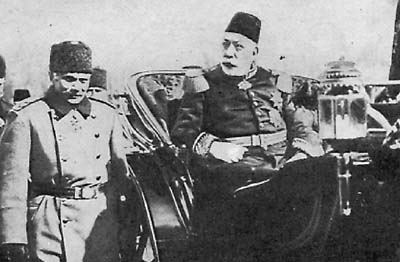
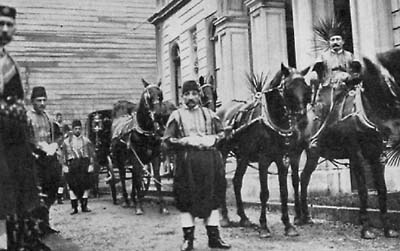
Fig. 10. MOHAMMED
V, LATE SULTAN OF TURKEY. His majesty was a kind-hearted old gentleman,
entirely ignorant of the world and lacking in personal force and initiative.
The lower picture shows the Sultan's carriage at the American Embassy, waiting
to take Mr. Morgenthau to an imperial audience
By this time we had moved from the Embassy to our summer home on the Bosphorus. All the summer embassies were located there, and a more beautiful spot I have never seen. Our house was a three-story building, something in the Venetian style; behind it the cliff rose abruptly, with several terraced gardens towering one above the other; the building stood so near the shore and the waters of the Bosphorus rushed by so rapidly that when we sat outside, especially on a moonlight night, we had almost a complete illusion that we were sitting on the deck of a fast sailing ship. In the daytime the Bosphorus, here little more than a mile wide, was alive with gaily coloured craft; I recall this animated scene with particular vividness because I retain in my mind the contrast it presented a few months afterward, when Turkey's entrance into the war had the immediate result of closing this strait. Day by day the huge Russian steamships, on their way from Black Sea ports to Smyrna, Alexandria, and other cities, made clear the importance of this little strip of water, and explained the bloody contests of the European nations, extending over a thousand years, for its possession. However, these early summer months were peaceful; all the ambassadors and ministers and their families were thrown constantly together; here daily gathered the representatives of all the powers that for the last four years have been grappling in history's bloodiest war, all then apparently friends, sitting around the same dining tables, walking arm in arm upon the porches. The ambassador of one power would most graciously escort to dinner the wife of another whose country was perhaps the most antagonistic to his own. Little groups would form after dinner; the Grand Vizier would hold an impromptu reception in one corner, cabinet ministers would be whispering in another; a group of ambassadors would discuss the Greek situation out on the porch; the Turkish officials would glance quizzically upon the animated scene and perhaps comment quietly in their own tongue; the Russian Ambassador would glide about the room, pick out someone whom he wished to talk to, lock arms and push him into a corner for a surreptitious tête-à-tête. Meanwhile, our sons and daughters, the junior members' of the diplomatic corps, and the officers of the several stationnaires, dancing and flirting, seemed to think that the whole proceeding had been arranged solely for their amusement. And to realize, while all this was going on, that neither the Grand Vizier, nor any of the other high Turkish officials, would leave the house without outriders and bodyguards to protect them from assassination---whatever other emotions such a vibrating atmosphere might arouse, it was certainly alive with interest. I felt also that there was something electric about it all; war was ever the favourite topic of conversation; everyone seemed to realize that this peaceful, frivolous life was transitory, and that at any moment might come the spark that was to set everything aflame.
Yet, when the crisis came, it produced no immediate sensation. On June 29th we heard of the assassination of the Grand Duke of Austria and his consort. Everybody received the news calmly, there was, indeed, a stunned feeling that something momentous had happened, but there was practically no excitement. A day or two after this tragedy I had a long talk with Talaat on diplomatic matters; he made no reference at all to this event. I think now that we were all affected by a kind of emotional paralysis---as we were nearer the centre than most people, we certainly realized the dangers in the situation. In a day or two our tongues seemed to have been loosened, for we began to talk and to talk war. When I saw Von Mutius, the German chargé, and Weitz, the diplomat-correspondent of the Frankfurter Zeitung, they also discussed the impending conflict, and again they gave their forecast a characteristically Germanic touch; when war came, they said, of course the United States would take advantage of it to get all the Mexican and South American trade!
When I called upon Pallavicini to express my condolences over the Grand Duke's death, he received me with the most stately solemnity. He was conscious that he was representing the imperial family, and his grief seemed to be personal; one would think that he had lost his own son. I expressed my abhorrence and that of my nation for the deed, and our sympathy with the aged emperor.
"Jab, Jab, es is sear schrecklich" (yes, yes, it is very terrible), he answered, almost in a whisper.
"Serbia will be condemned for her conduct," he added. " She will be compelled to make reparation."
A few days later, when Pallavicini called upon me, he spoke of the nationalistic societies that Serbia had permitted to exist and of her determination to annex Bosnia and Herzegovina. He said that his government would insist on the abandonment of these societies and these pretentions, and that probably a punitive expedition into Serbia would be necessary to prevent such outrages as the murder of the Grand Duke. Herein I had my first intimation of the famous ultimatum of July 22d.
The entire diplomatic corps attended the requiem mass for the Grand Duke and Duchess, celebrated at the Church of Sainte Marie on July 4th. The church is located in the Grande Rue de Pera, not far from the Austrian Embassy; to reach it we had to descend a flight of forty stone steps. At the top of these stairs representatives of the Austrian Embassy, dressed in full uniform, with crêpe on the left arm, met us, and escorted us to our seats. All the ambassadors sat in the front pew; I recall this with strange emotions now, for it was the last time that we ever sat together. The service was dignified and beautiful; I remember it with especial vividness. because of the contrasting scene that immediately followed. When the stately, gorgeously robed priests had finished, we all shook hands with the Austrian Ambassador, returned to our automobiles, and started on our eight-mile ride along the Bosphorus to the American Embassy. For this day was not only the day when we paid our tribute to the murdered heir of this medieval autocracy; it was also the Fourth of July. The very setting of the two scenes symbolized these two national ideals. I always think of this ambassadorial group going down those stone steps to the church, to pay their respect to the Grand Duke, and then going up to the gaily decorated American Embassy, to pay their respect to the Declaration of Independence. All the station ships of the foreign countries lay out in the stream, decorated and dressed in honour of our national holiday, and the ambassadors and ministers called in full regalia. From the upper gardens we could see the place where Darius crossed from Asia with his Persian hosts 2,500 years before---one of those ancient autocrats the line of which is not yet entirely extinct. There also we could see magnificent Robert College, an institution that represented America's conception of the way to "penetrate" the Turkish Empire. At night our gardens were illuminated with Chinese lanterns; good old American fireworks, lighting up the surrounding hills and the Bosphorus, and the American flag flying at the front of the house, seemed almost to act as a challenge to the plentiful reminders of autocracy and oppression which we had had in the early part of the day. Not more than a mile across the water the dark and gloomy hills of Asia, for ages the birthplace of military despotisms, caught a faint and, I think, a prophetic glow from these illuminations.
In glancing at the ambassadorial group at the church and, afterward, at our reception, I was surprised to note that one familiar figure was missing. Wangenheim, Austria's ally, was not present. This somewhat puzzled me at the time, but afterward I had the explanation from Wangenheim's own lips. He had left some days before for Berlin. The Kaiser had summoned him to an imperial council, which met on July 5th, and which decided to plunge Europe into war.
Chapter Four: Germany mobilizes the Turkish army